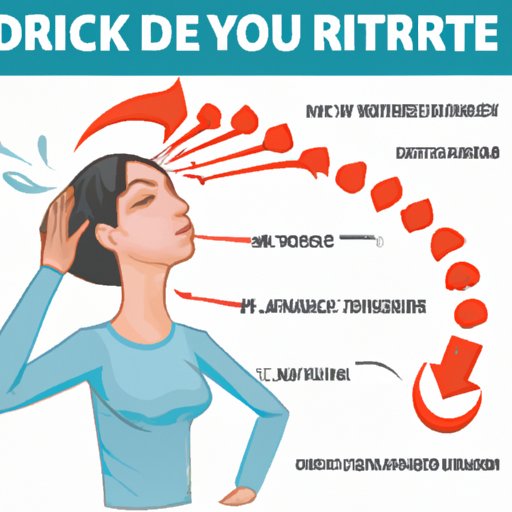
Introduction
Dizziness is a common symptom that can make you feel lightheaded, unsteady, or even faint. It can have various causes, including inner ear problems, low blood pressure, or anxiety. However, there are many ways to alleviate dizziness and improve your balance. In this article, we will explore different measures you can take to get rid of dizziness, from staying hydrated to practicing stress-reduction techniques.
The Importance of Staying Hydrated
Dehydration is a leading cause of dizziness because it can lower your blood pressure and reduce blood flow to your brain. To prevent dehydration, it’s essential to drink enough water throughout the day. Experts recommend drinking at least 8 cups of water daily, and more if you exercise or live in a hot climate. Other hydrating beverages like herbal tea or coconut water are also good options. Avoid sugary or caffeinated drinks that can dehydrate you and worsen your symptoms.
Dietary Changes
What you eat can also impact your dizziness. Skipping meals or consuming high-fat, high-sodium, or processed foods can lead to blood sugar fluctuations and low blood pressure, which can trigger dizziness. Therefore, it’s crucial to eat well-balanced meals and snacks that contain protein, complex carbs, and fiber. Some good options include whole grains, lean proteins, fruits and vegetables, and healthy fats like nuts or seeds. Additionally, some foods and drinks should be avoided if you experience dizziness, such as alcohol, caffeine, or salty foods.
Gentle Exercises
Certain exercises can improve your balance and reduce dizziness by strengthening your muscles and improving your coordination. Yoga, tai chi, and other mind-body exercises are low-impact and gentle activities that can promote relaxation and reduce stress. Additionally, walking, swimming, or cycling can be an excellent form of aerobic exercise that can improve your cardiovascular health. When exercising, make sure to do it in a safe and stable environment, wear appropriate shoes, and avoid sudden movements or overexertion.
Practice Stress-Reduction Techniques
Stress and anxiety are linked to dizziness because they activate your sympathetic nervous system and trigger a fight-or-flight response. When you’re stressed, your heart rate increases, your blood vessels constrict, and your breathing becomes shallow, which can result in dizziness, palpitations, or shortness of breath. Therefore, learning relaxation techniques like meditation, deep breathing, or progressive muscle relaxation can help you calm down and reduce your symptoms. You can also try visualization, aromatherapy, or massage therapy to alleviate stress and promote relaxation.
Visit a Chiropractor
If your dizziness is caused by a problem with your neck or spine, visiting a chiropractor might be helpful. Chiropractors are trained to detect and correct misalignments or subluxations in your neck and spine that can interfere with your nervous system function. By restoring proper alignment, chiropractic adjustments can relieve pressure on your nerves and blood vessels and improve your brain-body communication. However, make sure to choose a licensed and experienced chiropractor who uses safe and effective techniques.
Medication Management
Some medications can cause dizziness as a side effect, including blood pressure drugs, diuretics, or sedatives. If you experience dizziness after taking medication, talk to your doctor about adjusting your dosage or trying a different medication. In some cases, discontinuing the medication altogether may be necessary, but don’t quit any medication without consulting your doctor first. Also, don’t mix medications or alcohol, as this can increase your risk of dizziness or adverse effects.
Home Remedies
Several home remedies can help alleviate your dizziness without medication. For example, drinking ginger tea or taking ginger supplements can reduce nausea and vomiting associated with dizziness. Also, inhaling peppermint oil or lavender oil can have a relaxing effect on your nervous system and ease your symptoms. However, make sure to use essential oils according to the instructions and avoid applying them directly to your skin or ingesting them. Some herbal supplements may also interact with medication or have side effects, so consult a healthcare professional before using them.
Conclusion
Getting rid of dizziness requires a holistic approach that addresses the underlying causes of your symptoms. By staying hydrated, eating a healthy diet, exercising regularly, practicing stress-reduction techniques, visiting a chiropractor, managing your medications, and trying home remedies, you can reduce your dizziness and improve your balance. However, if your dizziness persists or worsens, or if you experience other symptoms like chest pain, breathing difficulties, or fainting, seek medical attention immediately.




